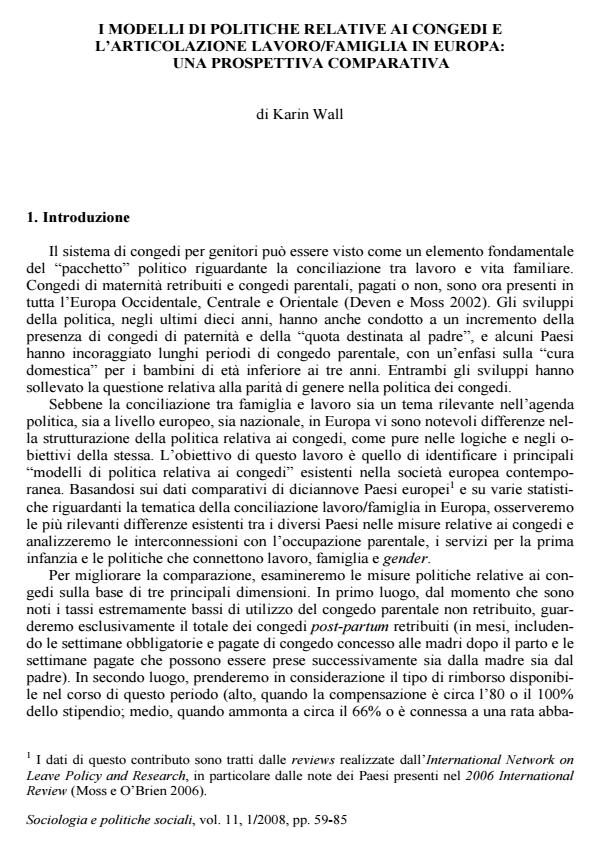I modelli di politiche relative ai congedi e l'articolazione lavoro/famiglia in Europa: una prospettiva comparativa
Titolo Rivista SOCIOLOGIA E POLITICHE SOCIALI
Autori/Curatori Karin Wall
Anno di pubblicazione 2008 Fascicolo 2008/1
Lingua Italiano Numero pagine 27 P. 59-85 Dimensione file 233 KB
DOI
Il DOI è il codice a barre della proprietà intellettuale: per saperne di più
clicca qui
Qui sotto puoi vedere in anteprima la prima pagina di questo articolo.
Se questo articolo ti interessa, lo puoi acquistare (e scaricare in formato pdf) seguendo le facili indicazioni per acquistare il download credit. Acquista Download Credits per scaricare questo Articolo in formato PDF

FrancoAngeli è membro della Publishers International Linking Association, Inc (PILA), associazione indipendente e non profit per facilitare (attraverso i servizi tecnologici implementati da CrossRef.org) l’accesso degli studiosi ai contenuti digitali nelle pubblicazioni professionali e scientifiche.
Leave Policy Models and the Articulation of Work and Family Life in Europe: a Comparative Perspective (by Karin Wall) - ABSTRACT: Leave arrangements for parents may be seen as a fundamental element of the policy package regarding the reconciliation of work and family life. Paid maternity leave and paid or unpaid parental leave are now available throughout Europe Western, Central and Eastern. Policy developments over the last decade have also increased the presence of paternity leave and of the father’s quota, and some countries have encouraged long periods of parental leave, with an emphasis on home care for children below age three. Although the politics of leave are high on the policy agenda, both at national and EU levels, within Europe there are considerable variations in the structuring and the use made of leave arrangements by parents, as well as in the rationales and objectives of leave policy. The aim of this paper is to explore the diversity of leave policy models that exist in contemporary European society. In contrast to other approaches, describing leave policies only on the basis of current leave arrangements or as connected primarily to main types of Welfare State, our approach focuses on the interconnections between leave policy measures and other policy and societal factors that help to shape and give meaning to leave policies: gender equality policy, elements of work/family policy which define the relationship between working parents and the Welfare State (such as the availability of services), expectations and practices concerning motherhood as well as the division of paid and unpaid labour in families with young children. Framed by this analytical strategy, results show that leave policy models are firmly embedded in the complex dynamics of work, family and gender policies. On the basis of comparative data for nineteen European countries, six main leave policy models are identified. To summarize this discussion it is important to emphasize that the policy models identified in this article must be viewed as complex and dynamic. Leave policy is receiving much attention at present, with most countries undergoing significant changes in recent years and reporting discussions about further changes for the near future. Moreover, the direction of change is constantly being shaped by internal political events, circulation of ideas between certain groups of countries and external pressures or developments such as EU directives and gender equity advocacy. In summary, analysis of major cross-national variations in leave policies suggests that the pathways followed are not as clear-cut and predictable as some theories of path dependency, of welfare state typologies would lead us to believe. Some countries closely fit a policy model developed within a particular type of Welfare State, others fit less closely or even appear to be hesitating between two different policy rationales and others are diverging cases which do not seem to fit any particular group of countries. This has implications for future analysis and seems to represent a twofold challenge for comparative leave policy research. First, future analysis should try to focus on slightly diverging routes as well as identifying the main leave policy models (on the basis of broad common characteristics of leave policy). Second, it is important to focus on models that, at a particular point in time, are more disconnected from the main configurations of work/family policy and practice.
Karin Wall, I modelli di politiche relative ai congedi e l'articolazione lavoro/famiglia in Europa: una prospettiva comparativa in "SOCIOLOGIA E POLITICHE SOCIALI" 1/2008, pp 59-85, DOI: